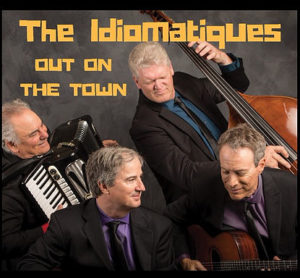

I first became aware of the Southern California “Django Jazz†quartet “The Idiomatiques†through my old friend from Musician’s Institute Craig Sharmat, who plays lead guitar and is a founding member of the band. Craig has done very well since graduating MI in one of the early classes, with his career including both lots of television and film scoring as well as a very successful career as a smooth jazz guitar artist, with a number of top ten CD to his credit. He was so successful in fact that he no longer needed to live in Los Angles to work, so moved to the SoCal Shangri-La of Santa Barbara. It was there that his recent love of Django inspired hot jazz prompted him to seriously start playing that music live, and so The Idiomatiques were born.
I actually got to do a couple of gigs with the band as a substitute rhythm guitarist, and it was a very enjoyable and impressive experience to both play and listen to the band up close for me. I am by no means the devotee of the style that they are and have to confess to just doing my best to come close to the level of authenticity that the other members of the band possess, but I definitely learned a lot on how to be creative in the style from listening to their solos and trying a few of my own. Brian Mann. on accordion, is a real standout, and I was always a fan of him from his work with Larry Carlton as his touring keyboard player in the 1980s, as well as stints with Kenny Loggins and Michael MacDonald. He’s a masterful improviser in any style of music he chooses to work in, as is Sharmat, and the energy of this duo is what really makes this band a stand out.
So I was definitely excited to hear their new record when I got it recently, and it definitely does not disappoint. The opening track “Worry You Needn’t, Maybe†is a tongue in cheek nod to the Thelonius Monk classic standard tune “Well You Needn’tâ€, and shows what happens when you take a traditional jazz genre and let players that can play other jazz styles at it. Both Sharmat and Mann burn up their solos on this one, and set the pace for the rest of the record.
“Scooby Doo†is like a stroll though Paris on a spring day, and shows the total command that both Brian Mann, the composer on this one, and Craig Sharmat have of the understanding of how to write compositions that both remain true to the idiom and new and fresh as well. The whole band grooves and swings like Fred Astaire tap dancing in a 40s musical.
The band goes to a wistful 3/4 mood on “Indifferenceâ€, that features Sharmat’s romantic reading of it’s beautiful melody, with the masterful embellishments one would expect from a Django style ballad. Mann’s sensitive accordion beautifully shades the guitar melody and solo, and then comes in strong for the bridge melody, and then bassist Kim Collins adds a beautifully done bass solo.
“Life Don’t Care†goes for a total period piece vocal that would be at home in a film noir detective film. The double time section is both hilarious and virtuosic – I’m going to be surprised if this tune doesn’t wind up in a movie with Sharmat and Mann’ film scoring connections.
“C’est La Vie†is a funky original from Craig, not the old standard you might expect. A definite “genre bender†tune to the hot jazz style, Sharmat snaps and pops his way through his solo, and Mann’s solo is both comedic and burning at the same time.
“Waltz Happening†adds Benedikt Brydern on violin, and opens with him on a “sample and repeat†melodic passage. His solo is broad and expansive, and this track particularly shows how meticulously the whole record was recorded. It’s almost like you are listening from inside each instrument, not to something that went through microphones before being recorded. This is really an ensemble tour de force, and George Quirin’s driving rhythm guitar has to really be given full credit for it’s impact on the bands overall sound.
“Out On The Townâ€â€™s vocal totally hits the vibe of the new swing movement, adding Tom Ball on harmonica this time to augment the band. Bluesy and plunking, it’s sort of the “Rock This Town†of the record.
“Maracas†takes things into a tango ballad mode, and really shows Sharmat’s total command of this genre of guitar playing. Brian’s composition includes a contrapuntal concept for the entire band, and really is one of the most musically impressive tracks on the record. Very “though-composed†in overall effect, there are still improvisational elements through the whole track, with lots of sections with totally different moods for variety. This is just a beautiful track in a whole lot of ways and concludes with a very orchestral flourish.
“Google This†is a funky swing minor 4/4 tune that is clearly a lot of fun to play over, and both Mann and Sharmat show what they can do over this kind of tune here. I could see this track making it’s way into other jazz genre radio playlists for sure.
“Big Blue Thing†takes you squarely back to the center of the hot jazz genre for an up tempo tune with plenty of interesting twists and turns. Sharmat definitely burns up the gypsy triplets in his solo here, and theres’ a hot shout chorus takes it out.
To take the record out, Kim Collin’s big baritone voice gives there version of the old classic “Lady Be Good†standard a lot of hipness and class, including some really nice background vocals. Brian Mann’s solo brings lots of cool reharmonization ideas that always serve up the surprises, which include the very cool final chord with vocal.
So, the bottom line is that I would love this record even if I didn’t know anyone on it, and even though I am far from a huge fan of hot jazz, there is so much here that goes beyond that genre while never violating it’s integrity, that I’m sure I’m going to listen to this one a lot in the future. The Idiomatiques bring something really fresh and their own to the world of hot Gypsy jazz. For more info or to purchase, go to: https://www.theidiomatiques.com/new-cd
Doug Perkins
Feb. 25, 2018